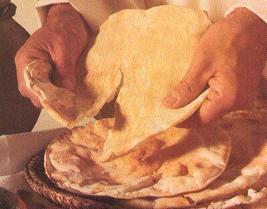 |
 |
 |
Passover BreadPassover bread, consistent with its symbolism, must be unleavened. In the book In the Heart of the Earth: The Secret Code That Reveals What Is In the Heart of God a scenario is presented for the order of events of Jesus' last days before His death and the days just after. It includes a Passover observance by Jesus and His disciples in the early hours of Nisan 15 on what we would call Thursday evening before His crucifixion and death on Friday. Some people have said this could not have been a Passover meal on the basis of the Greek word that is used for the Passover bread the gospels say was used at the meal. It is claimed that the word used - "artos" - indicates leavened bread and that the meal therefore was not a Passover observance. If it was true that leavened bread was used, this would definitely throw off the timing suggested in the book. But was it? Let's take a careful look. Note that this is part one of a four-part study on the question of whether the Last Supper was a true Passover observance. Unleavened Bread for Passover First, let's establish that Passover bread had to be unleavened. The directions for observance of Passover given in Exodus specified unleavened bread: "Thou shalt not offer the blood of my sacrifice with leavened bread; neither shall the fat of my sacrifice remain until the morning." (Exo 23:18) "And they shall eat the flesh in that night, roast with fire, and unleavened bread; and with bitter herbs they shall eat it.' (Exo 12:8) "And Moses said unto the people, Remember this day, in which ye came out from Egypt, out of the house of bondage; for by strength of hand the LORD brought you out from this place: there shall no leavened bread be eaten." (Exo 13:3) "Thou shalt eat no leavened bread with it [the Passover sacrifice]; seven days shalt thou eat unleavened bread therewith, even the bread of affliction; for thou camest forth out of the land of Egypt in haste: that thou mayest remember the day when thou camest forth out of the land of Egypt all the days of thy life." (Deut 16:3) Bread in Hebrew In Hebrew, there are distinct words for leavened and unleavened bread. The verses above use "matzah" for unleavened bread: 04682 There is also a word in Hebrew that specifically designates bread made with leaven: "Seven days shall ye eat unleavened bread; even the first day ye shall put away leaven out of your houses: for whosoever eateth leavened bread <02557> from the first day until the seventh day, that soul shall be cut off from Israel." (Exo 12:15) 02557 So the bread used at Passoverwas originally designated to be made with no leaven. The next page (part two of this four-part study) will describe the showbread and its significance as far as the question of whether the Passover bread was leavened or not. |
Prophecy Newsletter
Receive
free newsletters
reporting and analysing world events related to prophecy.
The Greek has multiple words for forgiveness? God forgives (charizomai) whether we ask or not. Receiving forgiveness (apheimi) is by our choice.
God always forgives!
|
|
|
|
||
|
| ||

New! Comments
Have your say about what you just read! Please leave a comment below.